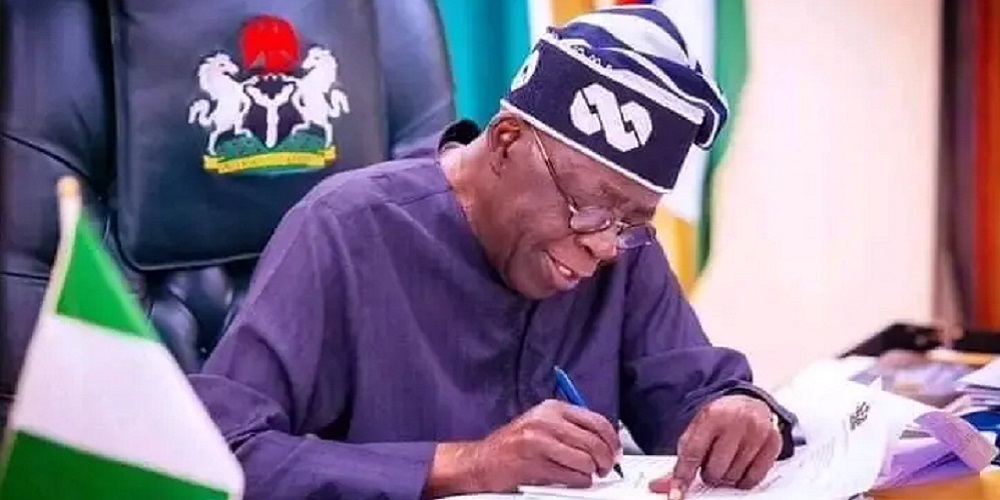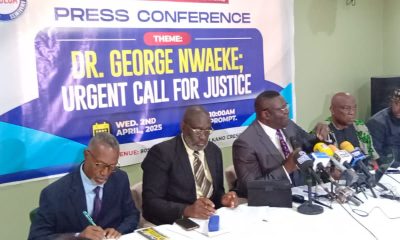News
Why Nigeria’s population may hit 450 million by 2050 – Experts warns

By Francesca Hangeior
Nigeria’s population may rise to 450 million in 2050 if urgent action is not taken to address the growing population, family planning experts have said.
The experts expressed their concerns at a media roundtable on Tuesday ahead of the eighth Nigeria Family Planning Conference organised by the Association for the Advancement of Family Planning in collaboration with the Federal Ministry of Health and Social Welfare, and other family planning stakeholders in Abuja.
In his opening remarks, the Chairman of the Management Committee, AAFP, and Chairman of the Local Organising Committee for the conference, Dr Ejike Oji, said Nigeria’s fertility rate was high and there was a need to reduce the rate to four per cent.
Ejike, who is also the Nigeria CSO Focal Point FP 2030 stated, “If we continue with the same fertility rate that we have now, our population is going to be driven to 450 million by 2050.
“If we do not bring down our fertility rates, by the year 2050, we will be 450 million, based on the percentage increase every year. Every year, we add about four million people to our population. So if you look at that, you know that it’s going to be a lot of problems for us.”
He further noted, “Remember that the increase is geometric. It’s not that it will stop at four million because there’s a percentage driving it. It’s four million this year; next year, it might be 4.2 million; the following year, it might be 4.5 million; it may get to a point where it might be five million or 10 million every year.”
The gynaecologist referenced China and India, the world’s two most populous countries, as models for managing population growth.
“About 50 years ago, China and India were among the poorest nations. However, today, China is the second-largest economy in the world, and India is rapidly growing.
“Both countries achieved this by lowering their fertility rates and investing in their youth. Nigeria has that opportunity. If we miss it now, if we don’t bring our fertility rate down to four per cent, by the year 2030, we’re going to be in serious trouble.”
Ejike stated that the fertility rate has, however, reduced from 5.3 per cent to 4.8 per cent.
The expert said the forthcoming conference, themed “Sustaining commitments for family planning within the Nigeria Health Sector Renewal Investment Initiative; advancing progress toward achieving FP2030 goals,” will reemphasise the importance of family planning.
Corroborating his statement, the Managing Director of FP 2030 North, West, Central Africa Hub, Dr Martin Migombano, said Nigeria’s population may hit 450 million by 2050 because of the size of the country.
“Also, 28.5 per cent of maternal mortality in the world happens in Nigeria. So there is still a lot that needs to be done by our partners, religious leaders, the government, financial partners who are donors, and others.
“They are all coming to the conference to pledge again and make sure that whatever investments are being made is going to the grassroots, where women actually should access family planning.
“But the key one is how can a woman get access to family planning? How about commodities? How about the education of the population? So, we need all the partners. It’s a collaborative way of working. And again, after two years, we’ll come and assess whether we have made progress again or not, or we are still stagnating,” he said.
A consultant at Amref International, Mrs Ifesinachi Eze said disruptions in family planning and reproductive health services in humanitarian settings leave women with unmet family planning needs, as the disruptions strain the health systems and require collaborative solutions.
“To address these issues, USAID’s Propel Adapt project is developing a private sector engagement guide for FP/RH supply chains in humanitarian settings.
“This guide, created in collaboration with FP2030, supports countries in rapidly assessing private sector capacities, fostering public-private collaborations, and strengthening FP/RH supply chains during emergencies,” she noted.
Eze stated that collaboration is key to maximising impact in the health sector as no organisation can achieve sustainable development alone.
“Governments and the private sector need to work together to create the regulatory frameworks, financial incentives, and infrastructure that allow the health sector to thrive,” she added.
News
NNPCL failed to remit N500bn revenue in 2024 – World Bank

The World Bank has revealed that the Nigerian National Petroleum Company Limited has only been remitting 50 per cent of revenue gains from the removal of the Premium Motor Spirit subsidy to the Federation Account.
This disclosure is contained in the latest World Bank Nigeria Development Update, which highlights concerns over fiscal transparency and revenue management following the deregulation of the downstream petroleum sector.
It said out of the N1.1tn revenue from crude sales and other income in 2024, the NNPCL only remitted N600bn, leaving a deficit of N500bn unaccounted for.
The biannual report, titled “Building Momentum for Inclusive Growth,” said the national oil company used the remaining amount to settle its debt arrears.
In 2023, President Bola Tinubu received commendation from international financial agencies after he announced the removal of controversial petrol subsidies, a move that tripled petrol prices overnight but was projected to save the government billions of dollars annually.
The decision, part of broader economic reforms, was expected to free up funds for critical infrastructure and social programs.
But the plan was scuttled after backlash from Nigerians, as prices of household commodities more than tripled. The government only allowed full deregulation in October 2024, after the commencement of the Dangote refinery.
Despite the official removal, the World Bank report revealed that the NNPCL delayed the transfer of the associated revenue windfall, only commencing remittances to the Federation Account three months later, in January 2025.
It said the national oil firm has since been remitting just half of the proceeds, with the remainder reportedly used to offset legacy arrears.
The World Bank noted that the Federal Government’s revenues for 2025 are anticipated to be 70 per cent from oil and 30 per cent from non-oil sources, assuming full remittance of the fiscal savings from PMS subsidy removal.
“The fiscal outlook remains cautiously optimistic but hinges on the necessary consolidation of recent advances. First, it is essential to ensure that the full revenue gains from the removal of the PMS subsidy—estimated at 2.6 per cent of GDP in 2024—are transferred to the Federation.
“Despite the subsidy being fully removed in October 2024, NNPCL started transferring the revenue gains to the Federation only in January 2025. Since then, it has been remitting only 50 per cent of these gains, using the rest to offset past arrears,” the World Bank stated.
A further breakdown showed that NNPCL was the only laggard, remitting just N0.6tn to FAAC in 2024, down from N1.1tn in 2023.
The World Bank attributed this drop to the implicit subsidy regime that persisted until the third quarter of 2024.
It explained, “Gross FAAC revenues surged in 2024, but a large share was deducted and remitted back as revenues to states and local governments.
“Gross revenues collected by Nigeria’s main revenue agencies surged in 2024, despite minimal remittances from NNPCL. FAAC data show that gross revenues collected by the main revenue agencies (FIRS, NCS, NNPCL, and NUPRC) rose significantly from N16.5tn (7 per cent of GDP) in 2023 to N29.5tn (10.6 per cent of GDP) in 2024.
“The largest revenue increases came from FX-denominated sources that benefited from the removal of the FX subsidy, including oil revenues (royalties, taxes, signature bonuses), customs revenues, and the foreign trade-related component of VAT.”
While other FX-denominated revenue sources, such as oil royalties, taxes, and customs duties, recorded significant increases, the report noted that NNPCL remained the major laggard in remitting revenues to the Federation Account Allocation Committee.
“However, NNPCL was the only laggard, remitting just N0.6tn to FAAC in 2024, down from N1.1tn in 2023, largely due to the implicit PMS subsidy, which remained in place until the end of September 2024. Although the subsidy was fully removed on October 1, 2024, NNPCL did not start transferring the resulting revenue gains to the Federation until January 2025. From that point, it began remitting 50 per cent, with the other half being used to settle past arrears.
“As of February 2025, the bank noted that NNPCL’s claimed arrears stood at N7.8tn, while the Federation’s claims totalled N6.1tn, leaving net arrears of N1.7tn still owed to the national oil company.
“In spite of a sharp rise in gross revenues by the country’s main revenue-generating agencies from N16.5tn in 2023 to N29.5tn in 2024, NNPCL’s remittance fell to N600bn in 2024, down from N1.1tn in the previous year.”
To enhance fiscal discipline, the World Bank recommended a forensic audit of NNPCL’s finances and the adoption of standardised reporting templates to FAAC.
It also called for improved transparency in oil revenue accounting and stronger public financial management systems.
The Bretton Woods institution warned that unless full subsidy gains are channelled into the Federation Account, Nigeria’s fiscal consolidation efforts may be undermined, limiting the government’s ability to invest in infrastructure and social development.
The report stressed that resolving net arrears and ensuring full remittance of subsidy savings are critical for maintaining fiscal stability.
It stated, “The fiscal outlook remains cautiously optimistic but hinges on the necessary consolidation of recent advances.”
“It is essential to ensure that the full revenue gains from the removal of the PMS subsidy—estimated at 2.6 per cent of GDP in 2024—are transferred to the Federation.”
“Resolving any remaining net arrears and channelling the full benefits of subsidy reform to the Federation is critical for sound fiscal management.
“Improve public finance management. Revenues are still low, constraining development spending. Ensure that revenue gains from the removal of the PMS subsidy flow to the Federation.
“The bank also advised to improve transparency in accounting for oil revenues by conducting a forensic audit of NNPCL, and adopting standardised reporting to FAAC.”
News
FG launches smart police station in Abuja

The Federal Government has reaffirmed its commitment to improving internal security and enhancing grassroots policing with the inauguration of a state-of-the-art smart police station in Katampe, Abuja.
The facility, constructed by the Nigeria Police Trust Fund and officially handed over to the Nigeria Police Force on Wednesday, is designed to improve operational efficiency and foster stronger police-community relations within the Federal Capital Territory.
Additional smart police stations are expected to be commissioned in Kogi, Enugu, and other parts of the country in the coming days.
Representing the Minister of Police Affairs, Ibrahim Gaidam, at the event, the Permanent Secretary of the ministry, Dr. Anuma Nla, described the project as a symbol of the government’s determination to uphold law and order at the community level.
“It embodies our collective resolve to entrench law and order, improve community-police relations, and ensure that every citizen can live without fear,” Nla said.“It stands as a beacon of hope, a pledge of protection, and a commitment to service delivery at the grassroots.”
He urged officers posted to the new station to maintain the highest standards of professionalism, integrity, and respect for human rights, emphasising the importance of prompt, fair, and accountable policing.
Nla also reiterated the Federal Government’s commitment to strengthening the capacity of the Nigeria Police Force in line with President Bola Tinubu’s Renewed Hope Agenda.
“This police station is a clear demonstration of our resolve to ensure a safer and more secure Nigeria,” he added.
Underscoring the importance of integrating modern technology into policing, he called on the Inspector General of Police to deploy digitally trained officers to the facility for optimal utilization of its capabilities.
In his remarks, the Executive Secretary of the Nigeria Police Trust Fund, Mohammed Sheidu, described the smart station as a “mission statement for nation-building.”
According to him, the new facility features perimeter fencing, CCTV surveillance, overhead water tanks to ensure uninterrupted supply, and a 30-kilowatt off-grid solar power system made possible through a partnership with the Rural Electrification Agency.
“This is not just another police station,” Sheidu stated.
“It is a secure, efficient, and community-oriented policing hub built to meet the evolving standards of law enforcement in today’s Nigeria.”
He also announced the launch of a six-man rank-and-file quarters project aimed at improving police officers’ living conditions.
“No officer should have to face the burden of duty while contending with inadequate living conditions,” he said.
“This is a tangible step towards boosting morale and ensuring our personnel, especially at the front lines, have the stability to perform their roles with excellence.”
Sheidu concluded by stressing the importance of accountability and judicious use of public resources, urging officers to maintain the new facility with professionalism and pride.
News
Tinubu approves procurement thresholds for MDAs

President Bola Tinubu has approved the immediate implementation of the revised procurement thresholds for Ministries, Departments and Agencies [MDAs].
The approval is based on the recommendation by the Director General of Bureau for Public Procurement [BPP] Dr Adedokun Adebowale, in alignment with the President’s Renewed Hope Agenda.
The details of the implementation guidelines will be provided by the DG of the BPP on Thursday, May 15, 2025.
-

 News21 hours ago
News21 hours agoJust in: NNPC Cuts Petrol Price Amid Competitive Moves with Dangote Refinery
-

 News15 hours ago
News15 hours agoJust in: FG receives Wigwe’s helicopter crash report from NTSB
-

 Entertainment15 hours ago
Entertainment15 hours agoSAD ! Popular Nollywood actress, Monalisa Stephen is dead
-

 News18 hours ago
News18 hours agoSAD! Popular Broadcast Journalist Bukola Agbakaizu Slumps, Dies Before Afternoon Shift
-

 News24 hours ago
News24 hours agoKano varsity shuts female hostel over immorality
-

 News15 hours ago
News15 hours agoJust in: Tinubu’s son Seyi, Tops Controversial List As Lagos Guber Race Ignites Political Wahala
-

 News17 hours ago
News17 hours agoPDP headache: Saraki’s Cttee signals there’s genuine intention to reconcile and resolve knotty issues -Hon Teejay Yusuf
-

 News22 hours ago
News22 hours agoBUNKERING: Army, Tantita Security Arrest Truck Laden with Illegally Extracted Crude Oil in Delta

















